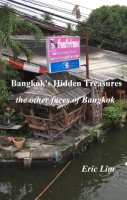| Back to Back Issues Page |
 |
|
Bangkok Travelbug Mar 2022 Prasart Nakhon Luang–the forgotten monument February 26, 2022 |
| Hello
Brief history of Prasart Nakhon Luang Prasat* Nakhon Luang was constructed in 1631 in the reign of King Prasat Thong (1629 – 1656) near the Pasak River. It served as a royal residence for Ayutthaya kings on route to Saraburi to visit Buddha's footprint. *Prasat is defined in the Thai-English dictionary as an abode to the gods in the clouds, a tower, a castle. 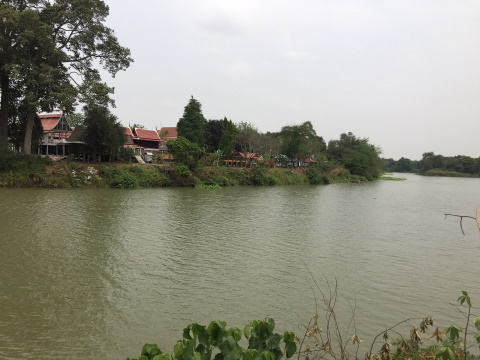 The Pasak River King Prasat Thong's ascension to the throne of Ayutthaya was marred by bloodshed. He had the two boy kings prior to his reign removed and executed, made himself king and started the Prasat Thong dynasty. The dynasty he started only had three more kings and was plagued with violence and bloodshed. The two kings after him were also removed and killed** **Kings of Ayutthaya prior to and after King Prasat Thong (1628 – 1688) Chetta 13 Dec 1628 – Aug 1629 Athittayawong Aug – Sept 1629 Prasat Thong Sept 1629 – 7 Aug 1656 Somdet Chaofa Chai 8 Aug – Sept 1656 Somdet Phra Si Suthammaracha Sept – 26 Oct 1656 King Narai 26 Oct 1656 – 11 July 1688 Source: Thailand – A Short History by David K Wyatt Second Edition Silkworm Books King Prasat Thong was considered a usurper as he had no royal blood. He tried to legitimise his claim to the throne by the dubious claim that he had links with previous Khmer kings. Perhaps that was why Prasat Nakhon Luang was built in Khmer styled architecture and also why he adopted the title, "King Prasat Thong", (King of the Golden Palace). With such a blood-stained background of its builder, it's little wonder that Prasat Nakhon Luang was tucked away from memory. There's no mention of Prasat Nakhon Luang in David Wyatt's history book on Thailand, although Wyatt describes the violent removal of King Prasat Thong's two predecessors and two successors. Similarly, I haven't come across a guide book on Ayutthaya that mentions Prasat Nakhon Luang. Let us take a look at the design features of Prasat Nakhon Luang. For more on the monuments in old Ayutthaya, please see Ayutthaya, from the ashes of destruction Contents Design features Prasat Nakhon Luang was modelled after the Khmer temples in Cambodia particularly the Bayon temple in Angkor Thom. Thai royal artisans were sent to Cambodia to study the designs of the Khmer temples before commencing construction in Thailand. The design of the palace consisted of three concentric layers of square walls with the shrine located in the centre, like many of the Khmer temples. Prasat Nakhon Luang was registered as a national monument 1935 when restoration work began, restoration was only completed in 1994. 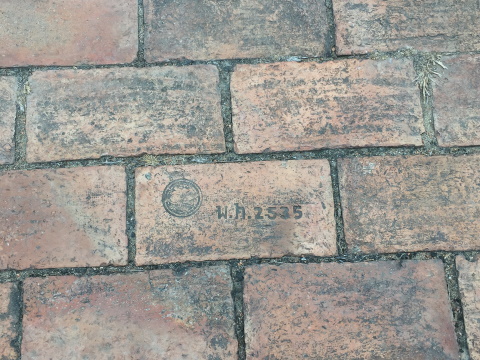
Date on this brick shows 1992 in the Christian era during the restoration process This satellite map shows the plan view of the prasat. If the map doesn't appear, please click on this link. As we can see from the plan view, the structure consists of three sets of square concentric walls, with a tower in the centre which is the shrine. Here are some shots behind the walls and inside the structure to give the reader an idea of the design features. 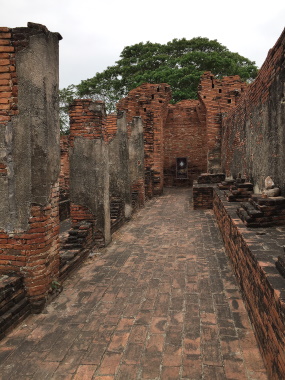
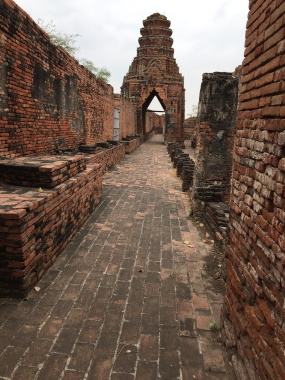
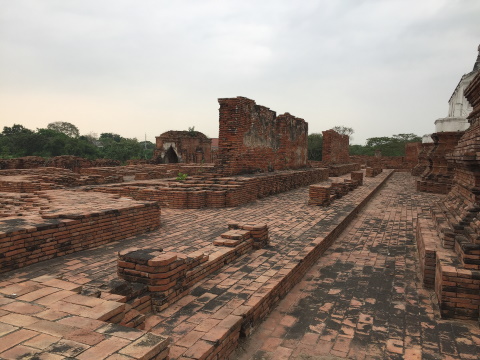
Behind the walls (top two photos), the rear of the prasat (bottom photo) For more on the features of Khmer temples, please see Phimai the Khmer sanctuary in Korat Contents Virtual tour Let's take a virtual tour of Prasat Nakhon Luang. We will pass under an arch to enter the premises through the market. There are rows of empty stalls along the approach, empty because it's not the tourist season and also because of the pandemic. 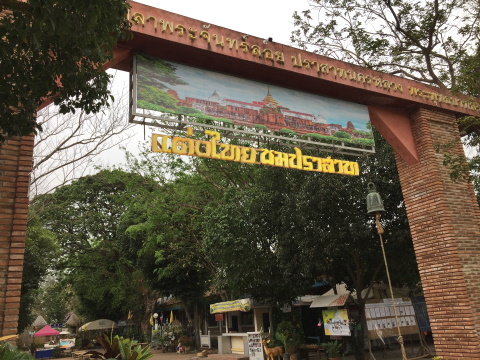
Arch over the entrance to the prasat 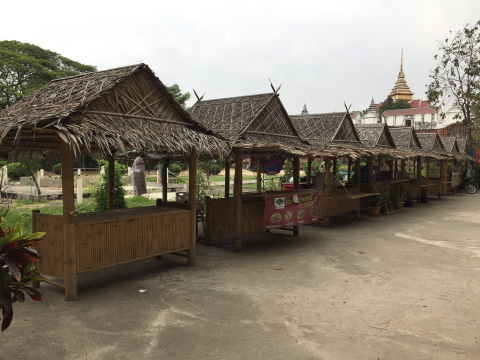
Empty stalls We were the only visitors while we were exploring the ruins. It was only as we were leaving that four other visitors came in. The visitor can't help but be impressed by the majestic view of Prasat Nakhon Luang as he approaches the palace from the front. 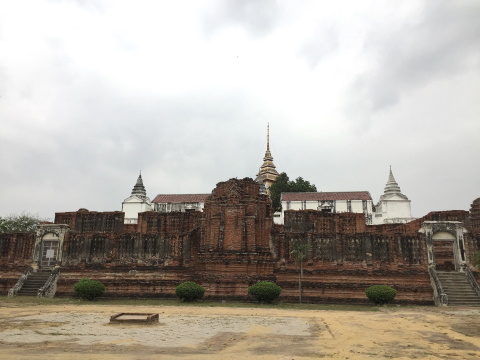
Front view of Prasat Nakhon Luang 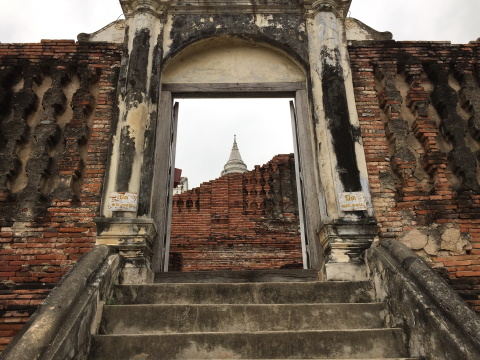
Stairs leading up to the entrance to the first set of walls 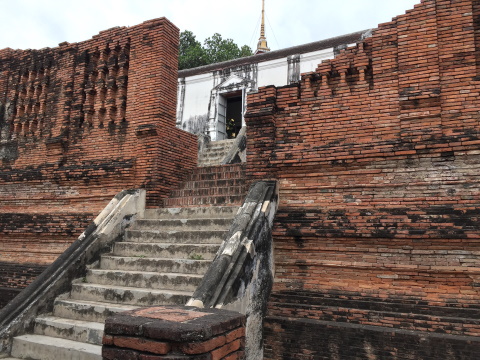
Stairs up the second set of walls, you can just see the white walls of the third set, the inner sanctuary where the shrines are located 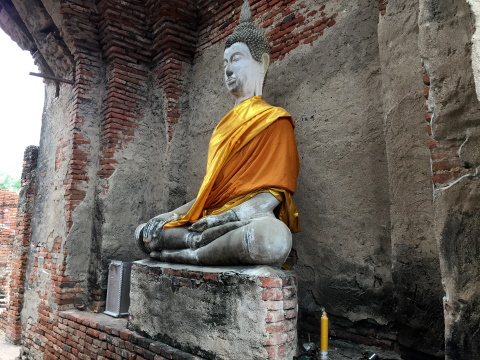
One of the many Buddha statues behind the second wall 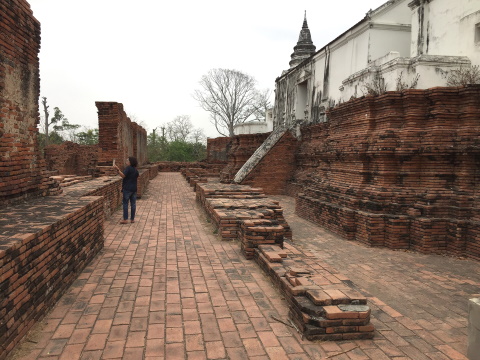
The third set of walls with the shrines within 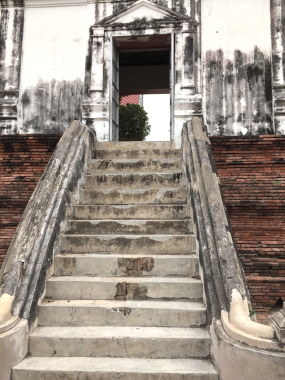
Stairs leading up to the inner sanctuary The cloister (covered walkway) behind the third set of walls is lined with Buddha statues. 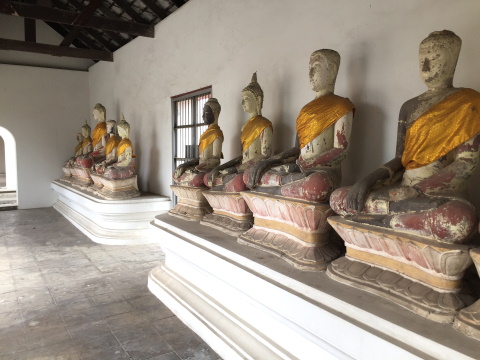
Buddha statues lining the covered walkway behind the third wall Unlike the Khmer sanctuaries in which there is only one tower containing the shrine within the inner walls, here there are two buildings; one yellow building dedicated to Ganesha the Elephant God and a white building with an imprint of Buddha's footprint. 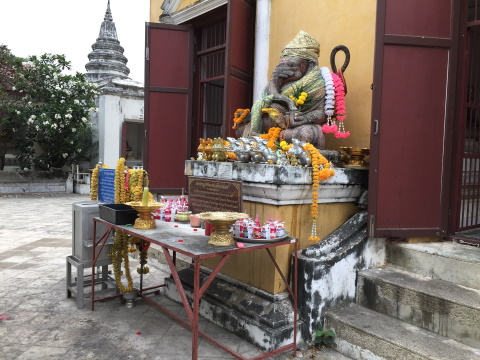
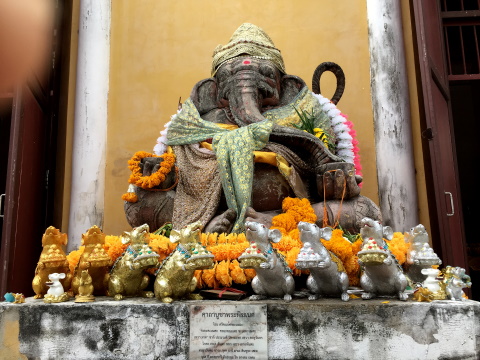
Entrance to Ganesha Shrine, notice the rats surrounding Ganesha, they are the steeds of Ganesha 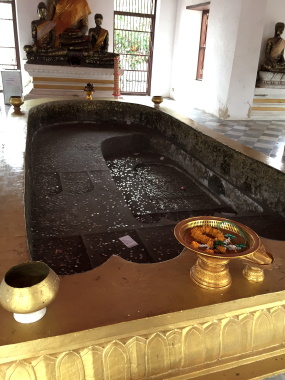
Shrine with the imprint of Buddha footprint With the dark and gloomy skies over us, we were lucky to finish exploring the ruins in time. 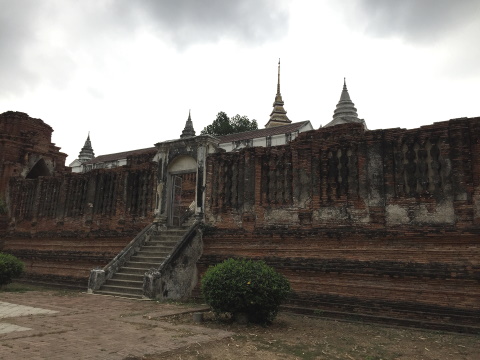
Last look before we go See you next month. Till then, stay safe and stay well. Contents Map to Prasart Nakhon Luang If the map doesn’t appear, click on this link How to get there From Bangkok – get on to highway 1- route 32 pass the old city of Ayutthaya – do not cross the bridge across the Pasak, make a U-turn under the bridge and turn into route 3063 – at the junction with route 33, turn left into route 33 – do not cross the bridge over the Pasak, turn right under the bridge into the road leading to Prasart Nakhon Luang. Parking Free parking is available in the carpark just across the road from Prasat Nakhon Luang. Opening hours: daily 0600 – 1800 hours Admission is free Contents Next month We visit Ban Thai Hom Kret, a beautiful traditional Thai building with traditional Thai art and vintage items on display. If you enjoyed reading this e-zine, please forward it to a friend. If you received this from a friend and found it interesting, please subscribe at Bangkok Travelbug. What do you think of the Bangkok Travelbug? We love to hear from you What other subscribers have said Eric Lim Tour Bangkok Legacies Find us on Facebook Bangkok’s Hidden Treasures – the other faces of Bangkok This is my third e-book which is a journal on my travels in Bangkok from late 2011 to early 2018. It’s a journey to the less travelled and lesser-known places in Bangkok, places that are treasure troves of history, art and culture of the diverse communities that make up Bangkok and Thailand. This journey will take us from the rice fields of Nong Chok near the eastern city limits of Bangkok across the city to the canals in Thawi Wattana in the west. Let's uncover these gems in Bangkok's hidden treasures together. Copyright@2008-2022 Tour Bangkok Legacies All rights reserved
|
| Back to Back Issues Page |
